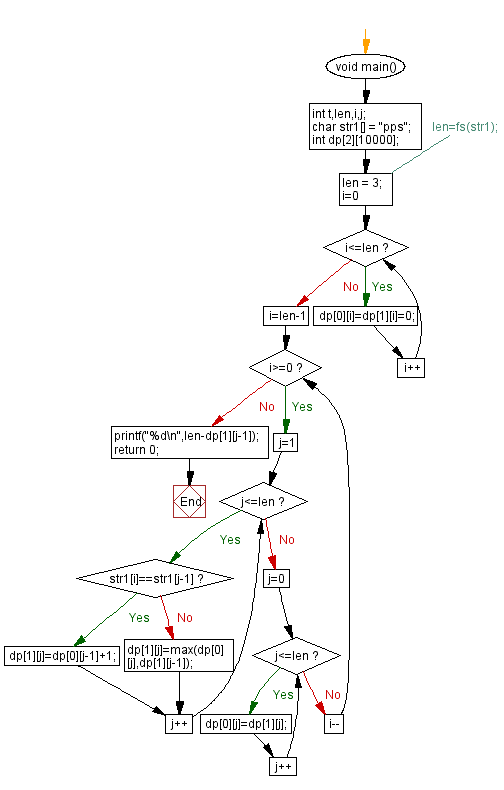C Exercises: Minimum number of characters to make a palindrome
29. Attractive Numbers Up to 100 Variants
Write a C program to find the minimum number of characters that must be inserted into a given string with no whitespace characters to make it a palindrome.
Note: For example, if str1 = "pps", we can change the string to "spps", adding only 1 character.
Sample Input: pps
Output: 1
C Code:
#include<stdio.h>
#define max(a,b) (a>b?a:b)
int void main()
{
int t,len,i,j;
char str1[] = "pps";
int dp[2][10000];
//len=fs(str1);
len = 3;
for(i=0;i<=len;i++) dp[0][i]=dp[1][i]=0;
for(i=len-1;i>=0;i--)
{
for(j=1;j<=len;j++)
{
if(str1[i]==str1[j-1]) dp[1][j]=dp[0][j-1]+1;
else dp[1][j]=max(dp[0][j],dp[1][j-1]);
}
for(j=0;j<=len;j++)
{
dp[0][j]=dp[1][j];
}
}
printf("%d\n",len-dp[1][j-1]);
return 0;
}
Sample Output:
1
Flowchart:

For more Practice: Solve these Related Problems:
- Write a C program to generate attractive numbers up to a user-specified limit and display them in sorted order.
- Write a C program to count and list attractive numbers up to 100 along with their defining properties.
- Write a C program to validate whether a number is attractive by comparing its digit sum and product.
- Write a C program to generate attractive numbers and then find the one with the highest factor count.
Go to:
PREV : Descending Prime Numbers (Strictly Decreasing Digits) Variants.
NEXT : Colorful Number Test Variants.
C Programming Code Editor:
Contribute your code and comments through Disqus.
What is the difficulty level of this exercise?
Test your Programming skills with w3resource's quiz.
